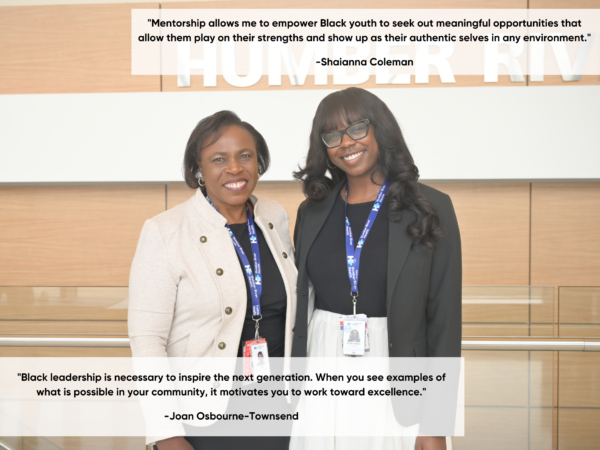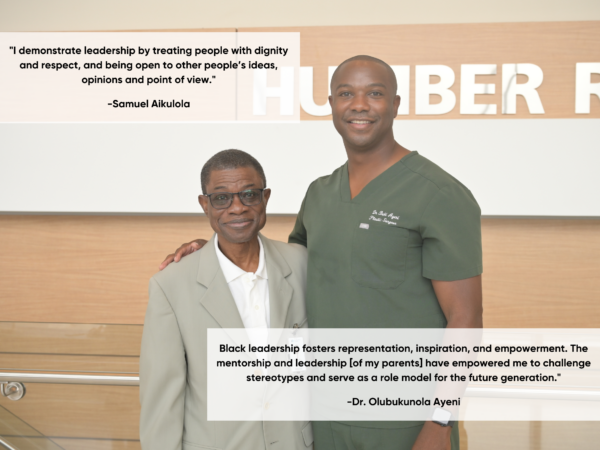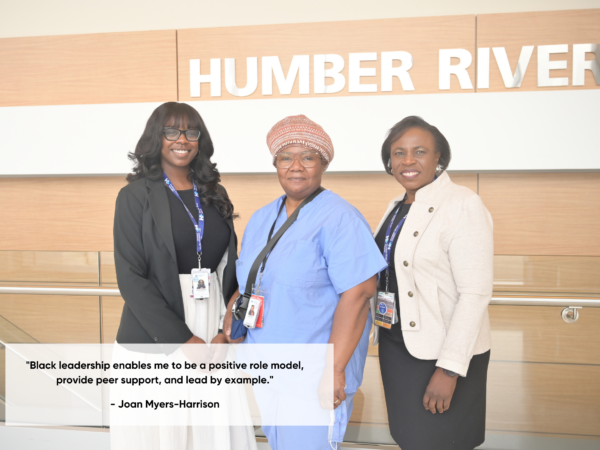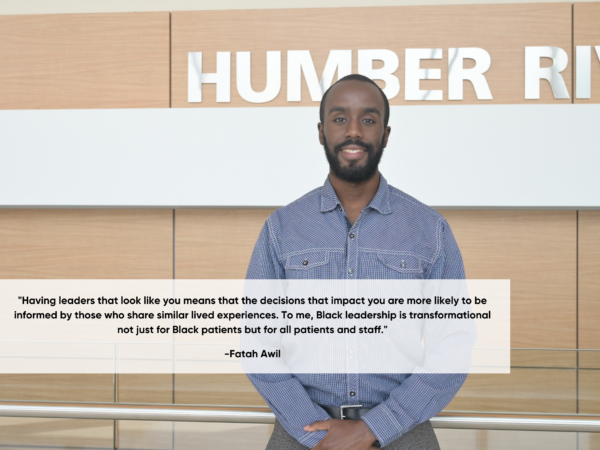Black Leaders Awareness Day
18
Jul
2023
Celebrated annually on July 18, Black Leaders Awareness Day is a time to reflect on the impact and contributions made by Black leaders of the past and present and recognize the role they play in inspiring future generations.
Various staff and physicians at Humber River Health have expressed their insight into the importance of Black leadership and the ways they incorporate it into their daily lives, including;
- Shaianna Coleman, Manager of Equity, Diversity and Inclusion
- Joan Osbourne- Townsend, Director of Infection, Prevention and Control
- Olubukunola Ayeni, Plastic and Reconstructive Surgeon
- Joan Myers-Harrison, Resource Nurse in Cancer Care Clinic
- Samuel Aikulola, Registered Nurse in Emergency Department
- Chris Maragh, Director of Integrated Health Systems and Partnerships (currently supporting the North Western Toronto Ontario Health Team)
- Fatah Awil, System Planner with the North Western Toronto Ontario Health Team

What is the importance of Black leadership and what does it mean to you?
Shaianna Coleman: Representation is an important part of Black leadership. When Black people see themselves represented in positions of leadership, particularly at an early age, it allows them to envision themselves in spaces and seek out valuable experiences. In healthcare specifically, Black representation can have a significant impact on improving health outcomes.
Joan Osbourne-Townsend: Black leadership is necessary to inspire the next generation. When you see examples of what is possible in your community, it motivates you to work toward excellence. For instance, when Barack Obama became the first Black President of the United States of America, one commentator remarked, “Now Black children can say, when I grow up, I want to be president of the United States.”

Dr. Olubukunola Ayeni: Black leadership fosters representation, inspiration, and empowerment. I grew up in a small town where my family was the only Afro-Canadian family, and incidentally my father was the only Black General Surgeon. I witnessed and learned from him, my mother, and the profound sacrifices they endured as pioneers leading our future. Ultimately, their mentorship and leadership have empowered me to challenge stereotypes and serve as a role model for the future generation.
Joan Myers-Harrison: Having Black leaders eliminates stereotypes and motivates younger generations to achieve various levels of education, different professions, and be anything they want to be. Black leadership means being resilient, having the ability to not only work hard and persevere, but to be able to overcome barriers and challenges. It enables me to be a positive role model, provide peer support, and lead by example at home and at work.
Samuel Aikulola: You are automatically identified with your race whether you are aware of it or not. Therefore, it is important to be comfortable in your own skin and understand the challenges and unique opportunities it brings. I know there are younger professionals who look like me, using me as a role model. I strive to provide the necessary support and ongoing encouragement to these individuals, as well as embed equity, diversity and inclusion in everything I do.

Chris Maragh: In healthcare, it is important to have different voices and perspectives in leadership roles to ensure that we develop an equitable healthcare system that will deliver high-quality care for people of all races, ethnicities, genders, sexual orientations, ages, and abilities. It sounds simple in practice, but having the right voices in the right settings can help address structural barriers of racism and inequalities that can affect our health and well-being.
Fatah Awil: Black leadership is important, especially in healthcare when you consider how much of it is relational. For a patient to build trust in a system, they need to see themselves reflected in that system. Having leaders that look like you means that the decisions that affect you are more likely to be informed by those who share similar lived experiences. To me, Black leadership is transformational, not just for Black patients but for all patients and staff.
Outside of your work at Humber, how do you demonstrate leadership in your daily life?
Shaianna Coleman: Mentorship allows me to empower Black youth to seek out meaningful opportunities that will allow them to play on their strengths and show up as their authentic selves in any environment – regardless of title or rank.
Joan Osbourne-Townsend: Over the years, I have had the opportunity to volunteer as a youth sponsor and income tax preparer for seniors, single, and low-income families. Currently, I am a Sunday school teacher for students in grades two to four at my local church.
Dr. Olubukunola Ayeni: I continuously develop my leadership skills in different ways, such as participating in school mentorship programs or surgical leadership programs through the Harvard Medical School. My sister, who leads the Black Entrepreneur Project, has also been a powerful mentor, as she has taught me the importance of promoting diversity and inclusion through innovation in our communities. Additionally, as a proud father of three, I continue to learn as much from my children as they learn from me, allowing us collectively develop our leadership skills together.
Joan Myers-Harrison: I demonstrate leadership in my daily life by teaching my family to be respectful to themselves and others in our diverse community. I work to improve my character traits, including honesty, empathy, trust, and hard work. Outside of work, I continue to practice our Humber values of CPR, “Compassion, Professionalism and Respect”.

Samuel Aikulola: I demonstrate leadership by treating people with dignity and respect, and being open to other people’s ideas, opinions and points of view. Many people are appreciative when they see my genuine interest in their ideas and opinions.
Chris Maragh: Outside of Humber, I demonstrate leadership by mentoring other healthcare professionals. I enjoy helping others reach and exceed their personal and professional goals.
Fatah Awil: While I have occupied leadership roles outside of work, it has occurred to me that one does not need a formal role or position to be a leader. We can be leaders simply by focusing on our circle of influence around us. For me, that looks like mentoring and supporting young people on their own professional journeys and paths to discovering their passions.

